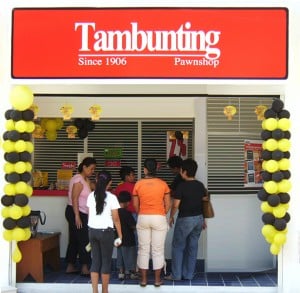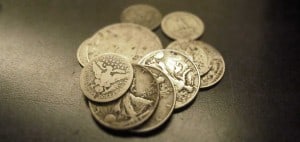
Customers line up at a Philippines pawnshop (photo by winwin1684)
Pawnbrokers are sometimes called “fringe bankers.” Well, we are called worse things. The people who call us “fringe” bankers are generally more or less sympathetic to what pawnbrokers do, in at least one of our many roles, which is to provide credit to people who are ineligible or unwilling to participate in “mainstream” banking.
At Kamaaina Loan And Cash For Gold, our average loan is about the same as for pawnshops nationwide — $150 or so. Try going to your local bank and asking for a loan that size. Unless you are a potential credit card customer/victim, you’ll be laughed out of the marble halls, in the politest way, of course.
But what about people who are afraid to go into a bank, even if they are in the economic class that bankers like to see? (In the United States, half of the typical bank’s customers generate 150% of profits, which means that the other half cost the bank money. That’s why banks are unwelcoming to little people.)
We almost have to look overseas to understand why some Americans are so wary of banks. Since the New Deal brought in effective deposit insurance for ordinary depositors, few working people have lost savings in a bank failure. (It is not well known, but before the New Deal, there were deposit savings insurance plans in some states, like Nebraska, but as banks failed by the thousands during “Coolidge prosperity,” small savers were wiped out anyway, because the insurance plans did not have sufficient backing.)
Here on Maui, we look to the Philippines, because so many of our residents trace their origin there. Filipino-Americans are an even larger proportion of our customer base than their status in the island (which is around one-third of all residents), This is commonly attributed to their suspicion of banks and bankers, which is something they brought with them, like a fondness for bibingka.
The Panay Times puts it this way:
Distrust in the banking system is probably the biggest reason why even the moneyed are cautious about keeping their eggs in one basket. It is no longer possible to count in one’s fingers the local banks that have folded up, leaving their depositors at the delayed mercy of the Philippine Deposit Insurance Corporation (PDIC), which could only refund no more than P400,000. If a depositor has more than that, sorry na lang.
(400,000 Philippine pesos is only about $8,000, compared with the $250,000 that the FDIC insures US accounts for.)
Even today, that newspaper reports, only one in 10 Filipinos have bank savings accounts. (We suspect the rate is quite a bit higher among Maui Filipino-Americans, but the residual suspicion of banks remains high. Probably it is reinforced by news from relatives back in the islands.)
Suspicion of banks may be good for us pawnbrokers, but when it spreads too far, it begins to hurt the overall economy, because banks cannot fulfill their function of providing business credit. In America, some pawnshops (ours included) make business loans, but it is not a big fraction of our volume.
In the Philippines, and in Southeast and South Asia generally, pawnshops are much more popular as a source of business capital. That is why some big financial operators are looking at funding online pawnshops directed at business startups in the region.
(Softbank, the main backer of this particular venture, is a gigantic Japanese firm that has been expanding from telecommunications into finance.)
One investor puts it this way:
“The online pawnshop is exactly the kind of innovation I believe can help unbanked citizens. The Philippines is the ideal market to start the service, as pawning is the major financing method instead of banking for its people,” Yasu Seo said.
The Philstar.com report on this venture did not reveal how much money is flowing into pawnbrokers targeting startup businesses, but other reports suggest the total is in the tens of millions or low hundreds of millions of dollars. That is not insignificant but indicates the target borrower is an entrepreneur looking to start a small business, not large projects (which probably can tap international funds in places like Hong Kong or Singapore).
How did the Philippines come to distrust banks so? Under Spanish administration, there was no banking to speak of. When the United States gained control in the early 19th century, banks began to be opened in Manila, but communications were not adequate to foster banking in the remoter islands.
Also, most Filipinos in those days were on the edge of subsistence, so they had little money to put into savings accounts.
The disruption of the Japanese occupation was not helpful, as the islands switched currencies. After independence, banks have had only about 70 years to instill confidence in depositors, and they missed the opportunity by having too many failures and (according to Panay Times) too much chicanery.
The Philippines remain a poor country, with many millions of subsistence farmers who cannot aspire to a savings account, but estimates are that at least twice as many people could open accounts as actually do.
That helps make pawnshops important in the islands.
In America, banks do not have such bad reputations (at least for stiffing depositors) but it is still true that something like a quarter of Americans have little or no connection with a regular commercial bank — either because they don’t have enough income to bother or because (especially in some immigrant communities) they are suspicious of them.
That’s where we “fringe financial institutions” come in. Pawnshops provide a needed source of credit to people who are otherwise not welcome in lending offices. We are proud of being able to help.




